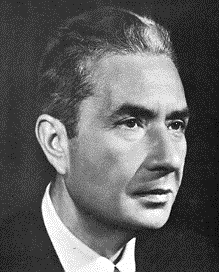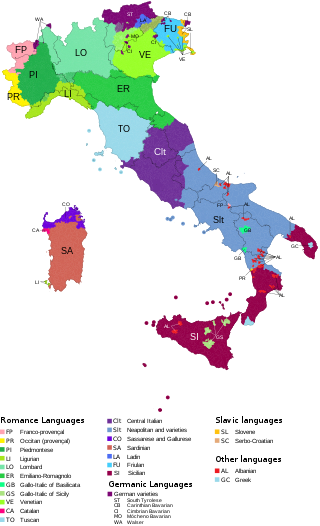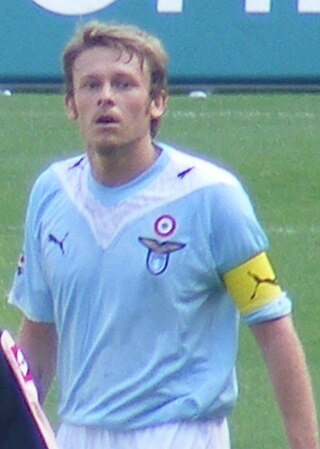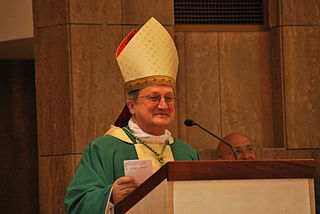
Roberto Baggio is an Italian former professional footballer who mainly played as a second striker, or as an attacking midfielder, although he was capable of playing in several offensive positions. He is the former president of the technical sector of the Italian Football Federation. A technically gifted creative playmaker and set piece specialist, renowned for his curling free-kicks, dribbling skills, and goalscoring, Baggio is widely regarded as one of the greatest players of all time.

Aldo Moro was an Italian statesman and prominent member of Christian Democracy (DC) and its centre-left wing. He served as prime minister of Italy in five terms from December 1963 to June 1968 and from November 1974 to July 1976.

Gianluca Vialli was an Italian football player and manager who played as a striker. Vialli started his club career at his hometown club Cremonese in 1980, where he made 105 league appearances and scored 23 goals. His performances impressed Sampdoria, who signed him in 1984 and with whom he scored 85 league goals, won three Italian cups, Serie A and the European Cup Winners Cup.

The languages of Italy include Italian, which serves as the country's national language, in its standard and regional forms, as well as numerous local and regional languages, most of which, like Italian, belong to the broader Romance group. The majority of languages often labeled as regional are distributed in a continuum across the regions' administrative boundaries, with speakers from one locale within a single region being typically aware of the features distinguishing their own variety from others spoken nearby.

Gian Luigi "Gianni" Morandi is an Italian pop singer, actor and entertainer. It is estimated that Morandi has sold about 50 million recordings.

Religion in Italy has been historically characterised by the dominance of the Catholic Church, the largest branch of Christianity, since the East–West Schism. This is in part due to the importance of Rome in the history of the Church, including its historical status as a leading patriarchate and the presence of the Vatican, the Catholic Church's headquarters and the residence of the Pope—the Bishop of Rome—within its borders. However, due to immigration, notably the influx of Muslims, Eastern Orthodox Christians, Protestants, Buddhists and Hindus, as well as proselytism and secularization, religious pluralism in Italy has increased in the 21st century. Italy also features a pre-Christian Jewish community, an autochthonous Protestant church–the Waldensian Evangelical Church and one of the largest shares of Jehovah's Witnesses in the world.

Roberto Baronio is an Italian former professional footballer who played as a defensive midfielder.

The Diocese of Biella is a Latin diocese of the Catholic Church in northern Italy, in the Piedmont region. The diocese was established in 1772. It is a suffragan of the Archdiocese of Vercelli. Biella is a city in Piedmont, 42 km (25 mi) northwest of Vercelli.
Ferdinando Baldelli was an Italian Catholic bishop. He was President of the Pontificia Commissione di Assistenza (1944–1959) and President of Caritas Internationalis (1951–1962).
Pontificia Commissione di Assistenza (PCA), also known as “Pontificia Commissione di Assistenza ai Profughi”, “Vatican mission” and “Vatican Relief”, was a papal ad hoc commission, created by Pope Pius XII on April 18, 1944, to provide quick, non-bureaucratic and direct aid to needy populations, refugees, and prisoners in war-torn Europe.
The Italian Catholic diocese of Castellammare di Stabia, on the Bay of Naples, existed until 1986. In that year it became part of the archdiocese of Sorrento-Castellammare di Stabia.

Francesco Moraglia is an Italian prelate of the Catholic Church. He has been Patriarch of Venice since March 2012; he is the first native of Genoa to hold that position. He was bishop of La Spezia-Sarzana-Brugnato from 2008 to 2012.

Enrico dal Covolo SDB is a Catholic bishop and Italian theologian, Assessor of the Pontifical Committee for Historical Sciences from 15 January 2019. He previously served as the rector of the Pontifical Lateran University from his appointment on 30 June 2010 until 2 June 2018. In addition he was also the postulator of the cause of canonization of Pope John Paul I from 2003 until 2016.

The Istituto Nazionale di Alta Matematica Francesco Severi, abbreviated as INdAM, is a government created non-profit research institution whose main purpose is to promote research in the field of mathematics and its applications and the diffusion of higher mathematical education in Italy.

Giuseppe Lazzati was an Italian Roman Catholic rector of the Sacred Heart college in Milan and a former parliamentarian. He was also the founder of the Secular Institute of Christ the King. Lazzati served as a professor and for a time served as a politician at the close of the Second World War despite initial hesitance in doing so. He later resigned to further dedicate himself to his lecturing while instituting the Secular Institute of Christ the King to bring together men who wished to consecrate themselves to God though not as religious. He was a collaborator of several well-known figures in Italian politics such as Giorgio La Pira and Aldo Moro while he maintained close relationships with Pope Paul VI and Pope John Paul II.

Streetwise priests are Roman Catholic priests who exercise their spiritual mandate by living in structures in direct contact with the "street", which is their mission land. Historical streetwise priests include Philip Neri (1515–1595) and John Bosco (1815–1888).

Claudio Maniago is an Italian prelate of the Catholic Church who was named archbishop of Catanzaro-Squillace in 2021, after serving as the bishop of Castellaneta since 2014. He was previously an auxiliary bishop of Florence. He has led the liturgy programs of the Italian Episcopal Conference since 2015.

Cambiamo! was a centre-right political party in Italy, led by Giovanni Toti.

Supper in the House of Simon the Pharisee is a 1544 oil on canvas painting by Moretto da Brescia, now in the Chiesa della Pietà in Venice, Italy.

Giuseppe Baturi is an Italian Catholic prelate who has served Archbishop of Cagliari since 2020 and as secretary of the Episcopal Conference of Italy since 2022.

















